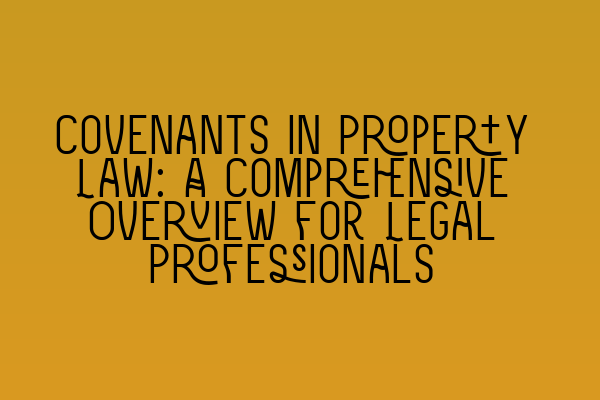Covenants in Property Law: A Comprehensive Overview for Legal Professionals
If you’re a legal professional working in property law, you know just how important covenants are. Covenants play a vital role in governing the use and development of land, and understanding them is essential for any solicitor practicing in this area.
In this comprehensive overview, we will delve deep into the world of covenants in property law. We’ll cover everything from the basics to more complex concepts, providing you with the knowledge and insights you need to confidently navigate this intricate area of law.
1. What are Covenants?
Let’s start with the basics. Covenants are legal obligations or agreements that are binding on the parties involved in a property transaction. They can be positive, requiring the doing of something, or negative, prohibiting certain actions. These covenants are typically contained within deeds and are often used to regulate the use, development, and enjoyment of land.
2. Types of Covenants
Covenants in property law can be categorized into various types:
a) Affirmative Covenants: These covenants require a party to actively perform certain actions or obligations. For example, a covenant to maintain the shared driveway in good repair.
b) Restrictive Covenants: These covenants place restrictions on the use or development of land. They often aim to preserve the value or character of a certain area. Examples include restrictions on building height or commercial activities.
c) Personal Covenants: Personal covenants are binding only on the parties to the original agreement and their successors in title. They do not run with the land.
d) Privity of Estate and Privity of Contract: These concepts determine whether a covenant can be enforced by or against subsequent owners. Privity of estate allows the benefit and burden of a covenant to pass to successors in title, while privity of contract applies when the original covenanting parties are still bound by the agreement.
3. Enforcing Covenants
Enforcing covenants can sometimes be a complex process. It’s important to understand the various methods available, including:
a) Injunctions: Court orders that prevent a party from breaching a covenant.
b) Damages: Compensation awarded to the injured party for any losses incurred due to a covenant breach.
c) Specific Performance: Court orders requiring the breaching party to perform the covenant as agreed.
4. Termination and Modification of Covenants
Covenants can be terminated or modified under certain circumstances. Common methods of termination include:
a) Release: The parties involved agree to release each other from the obligations of the covenant.
b) Breach: If one party breaches the covenant, it may be terminated or modified by the court.
c) Merger: When one person acquires both the benefited and burdened lands, the covenant is deemed to be discharged.
5. Drafting Effective Covenants
When drafting covenants, it’s crucial to ensure they are clear, specific, and enforceable. Failing to do so may lead to disputes and legal challenges down the line. Seek the assistance of an experienced property solicitor to ensure that your covenants are effective and compliant with legal requirements.
6. Staying Up-to-Date with Property Law
As a legal professional, staying up-to-date with property law is essential to providing the best possible advice to your clients. Make sure to regularly review case law and statutory changes that impact covenants in property law. Consider enrolling in SQE 1 Preparation Courses to continually enhance your knowledge and prepare for any upcoming SRA SQE exams.
Conclusion
Covenants in property law are a fundamental aspect of regulating land use and development. Understanding the different types, enforcement methods, and termination procedures is crucial for any legal professional practicing in this area. By keeping abreast of changes in property law and maintaining a strong understanding of covenants, you’ll be equipped to effectively advise your clients and help them navigate any legal challenges they may face.
For additional resources and exam preparation materials, check out the following:
– SQE 1 Practice Exam Questions
– SQE 1 Practice Mocks FLK1 FLK2
– SQE 2 Preparation Courses
– SQE 1 Preparation Courses
– SRA SQE Exam Dates
Stay informed and elevate your property law expertise today!
